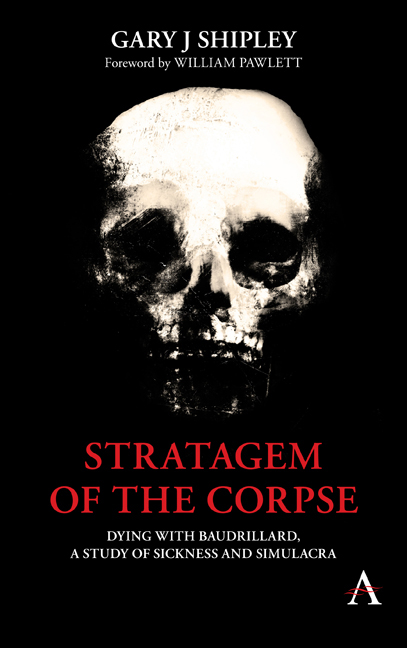Book contents
- Frontmatter
- Dedication
- Contents
- Acknowledgements
- Foreword by Pawletts William
- Introduction
- Chapter 1 On Decay and Other Synthetics
- Chapter 2 Stratagem of the Corpse
- Chapter 3 A Bleak Non-History of History
- Chapter 4 The Hyperactivity of Objects
- Chapter 5 The Unnamable Catastrophe
- Chapter 6 A Cure for Vertigo
- Chapter 7 Chance and the Temporality of Death
- Chapter 8 The Possibility of Nihilism
- Chapter 9 Smell-O-Vision: The Murder Show
- Chapter 10 The Evil Death
- Chapter 11 False Confessions and the Madness of Death: Making Death Speak
- Chapter 12 Black Light: Nigredo and Catastrophe
- Appendix 1 Whiteout: Spatiotemporal Interstices, Necropresence and the Immortality of Now
- Appendix 2 Pure Dreaming: Radicalized and Vermiculated Thought, or Death as an Earworm
- Appendix 3 The Non-Existence of the Scream
- Index
Chapter 12 - Black Light: Nigredo and Catastrophe
Published online by Cambridge University Press: 20 February 2020
- Frontmatter
- Dedication
- Contents
- Acknowledgements
- Foreword by Pawletts William
- Introduction
- Chapter 1 On Decay and Other Synthetics
- Chapter 2 Stratagem of the Corpse
- Chapter 3 A Bleak Non-History of History
- Chapter 4 The Hyperactivity of Objects
- Chapter 5 The Unnamable Catastrophe
- Chapter 6 A Cure for Vertigo
- Chapter 7 Chance and the Temporality of Death
- Chapter 8 The Possibility of Nihilism
- Chapter 9 Smell-O-Vision: The Murder Show
- Chapter 10 The Evil Death
- Chapter 11 False Confessions and the Madness of Death: Making Death Speak
- Chapter 12 Black Light: Nigredo and Catastrophe
- Appendix 1 Whiteout: Spatiotemporal Interstices, Necropresence and the Immortality of Now
- Appendix 2 Pure Dreaming: Radicalized and Vermiculated Thought, or Death as an Earworm
- Appendix 3 The Non-Existence of the Scream
- Index
Summary
The secrets we uncover will be more than secrets, and we will uncover only their secretness, because the ‘more hidden than hidden’ is not, as Baudrillard claims, ‘the secret’, but is instead an integrated secretness that reveals only its form and never its content; for secrets can be discovered and their secretness thereby removed, whereas an integrality of secretness is discovered only as far as it exists, its content remaining unknown. This secretness is the last shred of human meaning, and its very redundancy is its power, as ‘something redundant always establishes itself where there is nothing left’. Here lies the state of catastrophe, that dead end of proliferating potentialities, that turning with no place to turn, that end that cannot end, for history is finished, and ‘once this point of inertia has been passed, every event becomes catastrophe, becomes an event pure and without consequence (but that is its power)’.
This secretness, of ostensibly contentless form, and human death are one. Their darkness is a mutual darkness, a compacted and contained light, a light that illuminates only the decomposing promise of itself, with the corpse a sculpture of this light forever tending to inertia. As Baudrillard puts it:
We must grasp the catastrophe lying in wait for us in the slowing of light – the slower light is, the less it escapes its source. Things and events have a tendency to no longer allow their meaning to escape, to slow down its emanation, to capture what they formerly refracted and absorb it into a black body.
Black Light is human secretness, is our death, is meaning pulled continually forward into the blackened, necrotized corpse, the putrescent body of our perceived emancipation from the body – a freedom we do not understand, a dead light survived by its death.
The Black Light of human death and secretness is never quite at the speed of the living; it is never a light that discloses what it means in terms that meaning can grasp, and then strangulate. It's as if time and distance were different for each of them. Baudrillard writes: ‘If light drops to relative speeds, there is no more transcendence, no more God to recognize his own, and the universe lapses into indeterminacy.’
- Type
- Chapter
- Information
- Stratagem of the CorpseDying with Baudrillard, a Study of Sickness and Simulacra, pp. 169 - 176Publisher: Anthem PressPrint publication year: 2020



